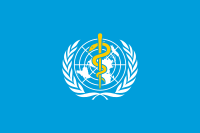
Photo from wikipedia
Background: Intersectoral collaboration is critical to the successful implementation of many public health interventions (PHIs). Little attention has been paid to whether and how processes at the stage of evaluation… Click to show full abstract
Background: Intersectoral collaboration is critical to the successful implementation of many public health interventions (PHIs). Little attention has been paid to whether and how processes at the stage of evaluation can promote intersectoral collaboration. The objective of this study was to examine European experiences and views on whether and how the evaluation of PHIs promote intersectoral collaboration. Methods: A qualitative study design was used. We conducted semi-structured interviews with 15 individuals centrally involved in the evaluation of PHIs in 6 European countries (Austria, Denmark, England, Germany, Norway, and Switzerland). Questions pertained to current processes for evaluating PHIs in the country and current and potential strategies for promoting intersectoral collaboration. Transcripts were analyzed using thematic analysis to identify key themes responding to our primary objective. Results: Experiences with promoting intersectoral collaboration through the evaluation of PHIs could be summarized in 4 themes: (1) Early involvement of non-health sectors in the evaluative process and inclusion of non-health benefits can promote intersectoral collaboration, but should be combined with greater influence of these sectors in shaping PHIs; (2) Harmonization of methodological approaches may enable comparison of results and facilitate intersectoral collaboration, but should not be an overriding goal; (3) Involvement in health impact assessments (HIAs) can promote intersectoral collaboration, but needs to be incentivized and be conducted without putting overwhelming demands on non-health sectors; (4) A designated body for evaluating PHIs may promote intersectoral collaboration, but its design needs to take account of realities of policy-making. Conclusion: The full potential for promoting intersectoral collaboration through the evaluation of PHIs appears currently unrealized in the settings we studied. To further promote intersectoral collaboration, evaluators and decision-makers may consider the full range of strategies characterized in this study. This may be most effective if the strategies are deployed so that they reinforce each other, value outcomes beyond health, and are tailored to maximize political priority for PHIs across sectors.
Journal Title: International Journal of Health Policy and Management
Year Published: 2020
Link to full text (if available)
Share on Social Media: Sign Up to like & get
recommendations!